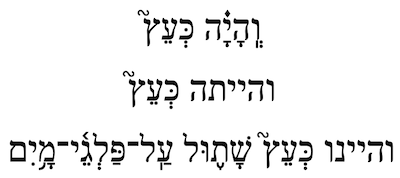V’haya k’aytz, v’hayita k’aytz,
v’hayinu k’aytz shatul al-palgay-mayim

He shall be like a tree; she shall be like a tree;
We shall be like a tree planted by flowing waters. (Psalm 1:3)
[Click (or tap) to see the entire Psalm 1 in Hebrew and English (JPS 1985).]
To plant ourselves by flowing waters, we need to find a place of nourishment, encouragement and support. There we can root ourselves in eternity, absorbing the flow from Eden, staying supple and open to blessing. That will be the secret to fruitfulness and success.
To hear the chants, use the audio players. To download a chant, right-click a note and save (or download) the linked MP3 file.
To download the PDF file for this chant, click Like a Tree PDF. For the musical notation, click Like a Tree notation PDF.

